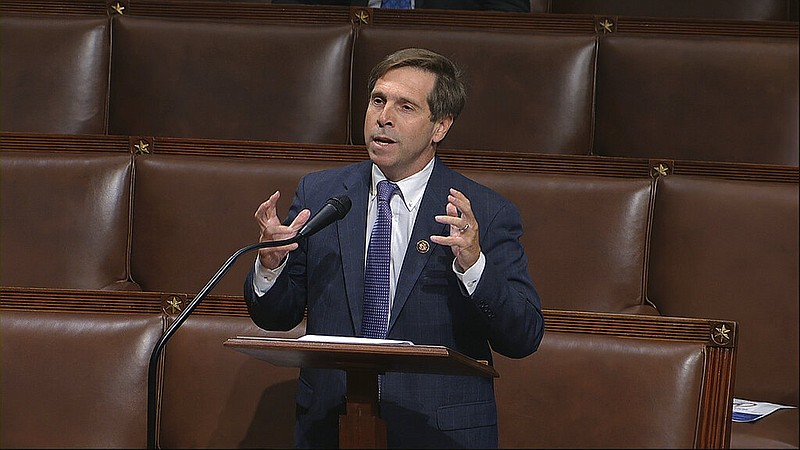You can't win if you don't play.
That's the message congressional Democrats delivered to Republicans this year after the party that controls the U.S. House and U.S. Senate decided to bring back earmarks, which are provisions individual Congress members tuck into spending measures that benefit their districts.
Ten years ago, Republicans, who had taken control of the House, banned earmarks because they said they had been abused by both parties - think of the infamous "Bridge to Nowhere" in Alaska - and only encouraged wasteful spending.
Earmarks went out in the House on the day in 2011 that U.S. Rep. Chuck Fleischmann, R-Chattanooga, came in, he recalled in an interview last week. He had largely campaigned against them in his 2010 primary in which he defeated 10 other candidates.
Earlier this month, House Republicans voted 102-84 in a closed-door session to go along with the Democrats' new process for what are no longer termed earmarks, but euphemistically called "Community Investment Funding."
Fleischmann would not say how he voted because he said votes are supposed to be kept secret. The public will know soon enough because the requests made for Community Investment Funding must be revealed within a month or so.
Since the congressman is a member of the House Appropriations Committee (Tennessee's only member), which drafts the spending bills and will have a say in which projects are selected for funding, we feel sure he voted in favor of the measure.
However, Fleischmann said "these are not your father's earmarks." The process for requesting and allocating the money is not the same, he said.
The money allocated for Community Investment Funding will total 1% of all discretionary spending in the fiscal 2022 federal budget, and discretionary spending will be the same with or without the earmarks. Discretionary spending (non- Social Security, Medicare, Medicaid, etc.) in the 2021 budget was $1.485 trillion, so 1% would have been $14.85 billion.
Among the tenets of the new process for project requests:
* Every member gets up to 10 funding requests (or as many as 4,350 requests from 435 members of the House); the dollar amount is not limited.
* The requests must be for municipal or nonprofit projects that have community support. Some will require matching local funds.
* The requests must be published by the House member, and the House Republican Conference said its members must explain in writing why the request is an "appropriate use of taxpayer funds."
* House members or their families can have no financial interest in the project.
* The deadline for funding requests is April 15, but Fleischmann said that deadline is likely to be extended.
At some point later this year, the House Appropriations Committee staff, along with House members, will determine which of the requests will be funded.
Senate Republicans have yet to say whether they will agree with their House counterparts and go along with the new Community Investment Funding. Eventually, though, all congressional spending must be scrutinized by both houses of Congress and a conference committee of the two.
After the closed-door House Republican Conference vote on March 17, 18 House Republicans - including U.S. Rep. Marjorie Taylor Greene, R-Georgia - sent a letter to House Speaker Nancy Pelosi, D-California, and said they "will not request earmarks."
However, Fleischmann said Democrats had warned the GOP that all of the money would "go to blue [Democratic] districts" if members did not agree to accept the new process.
He said one way to look at the issue is that the Community Investment Funding is 1% of discretionary spending the White House won't get to direct.
The congressman said he has no requests for projects on his desk at the moment, but an example of one might be funding for a new water system for Oak Ridge. The current system was transferred to the city from the U.S. Department of Energy in 2000. While programmatic federal appropriations typically cover things in that city like the Oak Ridge National Laboratory and the Y-12 National Security Complex, they would not fund the aging water plant that serves the federal sites as well as the city of nearly 30,000.
"The proof will be in the process," Fleischmann said. If Democrats wind up with the lion's share of funding despite having only a narrow majority in the House, "the potential to go forward will be dimmed." And Republicans will have a prime issue to take to voters in 2022.
The congressman acknowledged "strong feelings on both sides" among House members who are worried about so-called "sweeteners" that add to the country's $30 trillion debt and others who say it gives members the "ability to deliver more for your district."
"So far," Fleischmann said, the process has been done "in good faith"and has been "open, honest and transparent."
"We'll see if it's going to work," he said. "I'm an optimist. I want it to work."
Since the current lay of the land with Democrats is "their house, their rules," it hardly makes sense for Republicans to refuse to participate and miss out on something important for their district, lest it all go to Democrats. But Fleischmann and others should be judicious in their "asks" and reform the process when they retake the House.
